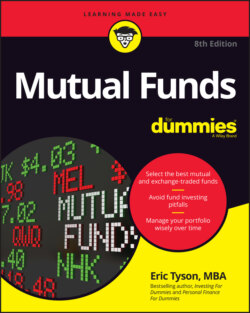Читать книгу Mutual Funds For Dummies - Eric Tyson - Страница 34
Financial intermediaries
ОглавлениеA mutual fund company is a type of financial intermediary. (Now that’s a mouthful!) Why should you care? Because if you understand what a financial intermediary is and how fund companies stack up to other financial intermediaries, you’ll better understand when funds are appropriate for your investments and when they probably aren’t. A financial intermediary is nothing more than an organization that takes money from people who want to invest and then directs the money to those who need investment capital (another term for money).
Suppose you want to borrow money to invest in your own business. You go to a bank that examines your financial records and agrees to loan you $20,000 at 6 percent interest for five years. The money that the banker is lending you has to come from somewhere, right? Well, the banker got that money from a bunch of people who deposited money with the bank at, say, 2 percent interest. Therefore, the banker acts as a financial intermediary, or middleman — one who receives money from depositors and lends it to borrowers who can use it productively.
Insurance companies do similar things with money. They sell investments, such as annuities (see Chapter 1) and then turn around and lend the money — by investing in bonds, for example — to businesses that need to borrow. (Remember, a bond is nothing more than a company’s promise to repay borrowed money over a specified period of time at a specified interest rate.)
The best mutual fund companies are often the best financial intermediaries for you to invest through because they skim off less (that is, they charge lower management fees) to manage your money and allow you more choice and control over how you invest your money. In this book, I highlight fund companies with excellent funds with the lowest costs.
